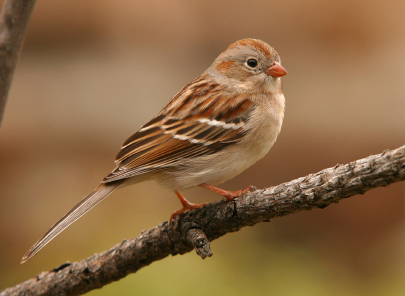Sparrows generally aren’t interesting. They’re drab, small, not much different from each other, and common.
Today I went to a wild field and saw a little brown bird. Sparrow. No need to define it further. But I looked through binoculars.
Wait. Not a Song Sparrow, which is what my guess was, since they hang out around here. Not a White-throated, White-crowned, Fox or House Sparrow.
Who cares? Just a sparrow. Then I noticed it had a strangely colored beak. Sort of pink. Bird books call that a field mark.
When I got home I leafed through my field guide’s sparrow section. Yeah, they had a sparrow with a pinkish beak. The rest of its field marks matched those I’d seen, too.
The field guide had identified my sparrow by pointing out its field mark, and I admit I found the moment interesting.
I got the buzz I used to get when I first started noticing that birds you see out in the world can be matched up to those in a book.
It was interesting, also, that the name of this bird with the distinctive field mark is: Field Sparrow.


I believe that in the Audubon’s book, The Birds of America, there were a number of birds that could not be identified. Some of the birds depicted were said to be extinct by the time the book was studied carefully. Some were considered as slight variations of existing birds. Two of the birds are a mystery. Am I wrong on this?
That little guy is sporting his breast cancer awareness gear, just like MLB last weekend!
Biblical bird watching: “But not a single sparrow can fall to the ground without your Father knowing it.” Mathew 10:29
Striking beauty. The little ones that God made. Nice to share this.
Bob’s comment relates to a photo he took, a combination of luck, sharp eyes and a good camera. It appeared in our blog post August 19, 2010…
http://twofistedbirdwatcher.com/?p=4817#comments
I believe that’s also called a “pink beaked small bird”, from what I know , it’s definitely not an “American Avocet” …